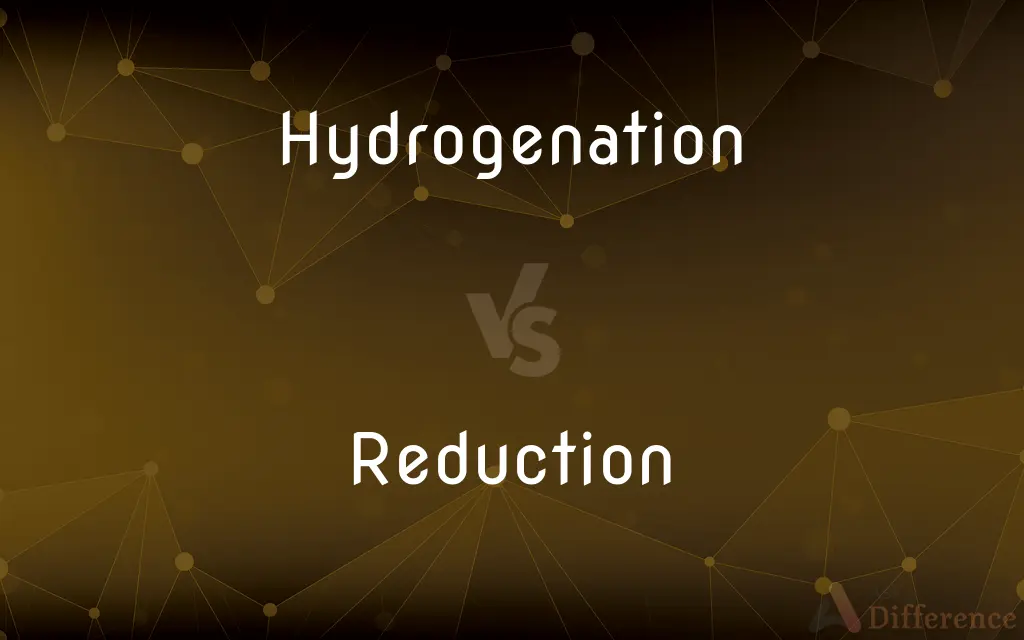Hydrogenation vs. Reduction — What's the Difference?
By Tayyaba Rehman — Updated on September 27, 2023
Hydrogenation is adding hydrogen to molecules, often to saturate unsaturated fats or oils. Reduction is a chemical reaction involving a gain of electrons or decrease in oxidation state. Both are specific types of chemical reactions.

Difference Between Hydrogenation and Reduction
Table of Contents
ADVERTISEMENT
Key Differences
Hydrogenation is a chemical process that involves the addition of hydrogen, usually to unsaturated fats or oils, making them more saturated. In contrast, reduction is a more generalized term representing any chemical reaction that involves the gain of electrons or a decrease in oxidation state. While hydrogenation specifically necessitates the presence of hydrogen, reduction can occur through various means and doesn’t necessarily involve hydrogen.
Hydrogenation is typically employed in the food industry to convert liquid oils into solid fats, thereby altering the texture and shelf-life of food products. Reduction, on the other hand, is a fundamental concept in chemistry and can be seen in myriad reactions, involving not only organic compounds but also inorganic ones. These reactions are not limited to the food industry but span across various scientific fields and applications.
In hydrogenation, the reaction specifically involves the use of hydrogen gas, and typically a catalyst like nickel is used to facilitate the reaction. Reduction, being a broader term, can involve various reagents and can be achieved by different methods, like the removal of oxygen, addition of hydrogen, or addition of electrons, depending on the context of the chemical equation.
Hydrogenation primarily focuses on modifying the physical properties of substances, particularly in the context of food production. However, reduction reactions encompass a variety of chemical processes and applications, such as the reduction of metal ores to obtain pure metals. Both processes are critical in their respective fields, but they have different scopes and applications.
While hydrogenation is a subtype of reduction, not all reduction reactions are hydrogenation reactions. This distinction arises because reduction reactions can involve different elements and compounds, reflecting the diversity and versatility of reduction reactions in chemistry, compared to the more specialized and focused nature of hydrogenation processes.
ADVERTISEMENT
Comparison Chart
Definition
Addition of hydrogen to molecules.
General term for gain of electrons.
Reactants
Involves hydrogen gas.
Can involve various reagents.
Applications
Primarily in the food industry.
In various chemical processes and industries.
Scope
Specific type of reduction.
Broad, includes many types of reactions.
Outcomes
Alters physical properties of fats.
Can yield various products, depending on reactants.
Compare with Definitions
Hydrogenation
Hydrogenation is a chemical process where hydrogen is added to a substance.
The hydrogenation of olive oil creates a product with a different texture.
Reduction
Reduction is a chemical reaction that involves the gain of electrons or a decrease in oxidation state.
In batteries, the chemical energy is released through a series of reduction reactions.
Hydrogenation
Hydrogenation typically involves the conversion of unsaturated fats to saturated fats.
Through hydrogenation, liquid vegetable oils are transformed into solid or semi-solid fats.
Reduction
Reduction is essential for balancing chemical equations as it pairs with oxidation in redox reactions.
The reduction of copper ions is coupled with the oxidation of zinc in a galvanic cell.
Hydrogenation
Hydrogenation can contribute to the alteration of the nutritional value of food items.
The hydrogenation of edible oils can increase the level of trans fats in food.
Reduction
The action or fact of making something smaller or less in amount, degree, or size
There had been a reduction in the number of casualties
Talks on arms reduction
Hydrogenation
Hydrogenation requires a catalyst, usually a metal, to proceed.
Nickel is often used as a catalyst in hydrogenation reactions.
Reduction
A thing that is made smaller or less in size or amount.
Hydrogenation
Hydrogenation is often used in the food industry to improve the shelf life of products.
The hydrogenation of oils in snack foods can extend their shelf life.
Reduction
The action of remedying a dislocation or fracture by returning the affected part of the body to its normal position
We must see if the fracture requires reduction
Hydrogenation
Hydrogenation is a chemical reaction between molecular hydrogen (H2) and another compound or element, usually in the presence of a catalyst such as nickel, palladium or platinum. The process is commonly employed to reduce or saturate organic compounds.
Reduction
The process or result of reducing or being reduced
The reaction is limited to reduction to the hydrocarbon
Hydrogenation
(chemistry) The chemical reaction of hydrogen with another substance, especially with an unsaturated organic compound, and usually under the influence of temperature, pressure and catalysts.
Reduction
Substitution of a sound which requires less muscular effort to articulate
The process of vowel reduction
Hydrogenation
The act of combining with hydrogen, or the state of being so combined.
Reduction
The act or process of reducing.
Hydrogenation
A chemical process that adds hydrogen atoms to an unsaturated oil;
Food producers use hydrogenation to keep fat from becoming rancid
Reduction
The result of reducing
A reduction in absenteeism.
Reduction
The amount by which something is lessened or diminished
A reduction of 12 percent in violent crime.
Reduction
A sauce that has been thickened or concentrated by boiling.
Reduction
(Biology) The first meiotic division, in which the chromosome number is reduced from diploid to haploid. Also called reduction division.
Reduction
A decrease in positive valence or an increase in negative valence by the gaining of electrons.
Reduction
A reaction in which hydrogen is combined with a compound.
Reduction
A reaction in which oxygen is removed from a compound.
Reduction
The canceling of common factors in the numerator and denominator of a fraction.
Reduction
The converting of a fraction to its decimal equivalent.
Reduction
The converting of an expression or equation to its simplest form.
Reduction
The act, process, or result of reducing.
Reduction
The amount or rate by which something is reduced, e.g. in price.
A 5% reduction in robberies
Reduction
(chemistry) A reaction in which electrons are gained and valence is reduced; often by the removal of oxygen or the addition of hydrogen.
Reduction
(cooking) The process of rapidly boiling a sauce to concentrate it.
Reduction
(mathematics) The rewriting of an expression into a simpler form.
Reduction
(computability theory) a transformation of one problem into another problem, such as mapping reduction or polynomial reduction.
Reduction
(music) An arrangement for a far smaller number of parties, e.g. a keyboard solo based on a full opera.
Reduction
A philosophical procedure intended to reveal the objects of consciousness as pure phenomena. (See phenomenological reduction.)
Reduction
(medicine) A medical procedure to restore a fracture or dislocation to the correct alignment, usually with a closed approach but sometimes with an open approach (surgery).
Closed reduction
Open reduction and internal fixation
Reduction
(paying) A reduced price of something by a fraction or decimal.
Reduction
(metalworking) The ratio of a material's change in thickness compared to its thickness prior to forging and/or rolling.
Reduction
The act of reducing, or state of being reduced; conversion to a given state or condition; diminution; conquest; as, the reduction of a body to powder; the reduction of things to order; the reduction of the expenses of government; the reduction of a rebellious province.
Reduction
The correction of observations for known errors of instruments, etc.
Reduction
The process of making a copy of something, as a figure, design, or draught, on a smaller scale, preserving the proper proportions.
Reduction
The bringing of a syllogism in one of the so-called imperfect modes into a mode in the first figure.
Reduction
The act, process, or result of reducing{7}; as, the reduction of iron from its ores; the reduction of an aldehyde into an alcohol.
Reduction
The operation of restoring a dislocated or fractured part to its former place.
Reduction
The act of decreasing or reducing something
Reduction
Any process in which electrons are added to an atom or ion (as by removing oxygen or adding hydrogen); always occurs accompanied by oxidation of the reducing agent
Reduction
The act of reducing complexity
Reduction
Reduction can involve the removal of oxygen or the addition of hydrogen to a molecule.
The reduction of iron ore involves removing oxygen to produce iron metal.
Reduction
Reduction reactions are ubiquitous and occur in various chemical processes across different industries.
The reduction of metals from their ores is a fundamental process in metallurgy.
Reduction
Reduction can occur through various methods and doesn’t necessarily involve hydrogen.
The reduction of a carbonyl compound can be achieved using sodium borohydride.
Common Curiosities
What is hydrogenation?
Hydrogenation is the chemical process of adding hydrogen to a substance, often to saturate unsaturated fats or oils.
What is reduction?
Reduction is a chemical reaction that involves the gain of electrons or a decrease in oxidation state.
Can reduction occur without hydrogen?
Yes, reduction can occur through various means, like the removal of oxygen or the addition of electrons, and doesn’t necessarily involve hydrogen.
Is hydrogenation a type of reduction?
Yes, hydrogenation is a specific type of reduction where hydrogen is added to molecules.
Why is hydrogenation important in the food industry?
Hydrogenation is important as it alters the texture and shelf-life of food products by converting liquid oils into solid or semi-solid fats.
Does hydrogenation require a catalyst?
Yes, hydrogenation typically requires a metal catalyst, such as nickel, to facilitate the reaction.
Can hydrogenation alter the nutritional value of foods?
Yes, hydrogenation can alter the nutritional value by increasing the level of trans fats in food items.
Is the concept of reduction limited to chemistry?
While predominantly a chemistry term, reduction can also be understood in various contexts like physics and biology, depending on the framework of discussion.
Can reduction reactions be reversed?
Yes, many reduction reactions can be reversed through oxidation reactions in redox pairs.
Is hydrogenation applicable to all types of substances?
No, hydrogenation is primarily applicable to unsaturated organic compounds like fats and oils.
What can be reduced in a reduction reaction?
In a reduction reaction, various elements and compounds can be reduced, including metal ions and organic compounds.
Are reduction reactions limited to the food industry?
No, reduction reactions are fundamental in chemistry and occur in various industries and scientific fields.
Is every reduction reaction a hydrogenation reaction?
No, not every reduction reaction is a hydrogenation reaction; reduction is a broader term that includes many types of reactions.
Does hydrogenation always result in saturated fats?
Mostly, hydrogenation results in more saturated fats, but the degree of saturation can be controlled to obtain semi-solid fats.
Share Your Discovery

Previous Comparison
Oneself vs. Yourself
Next Comparison
Respect vs. RevereAuthor Spotlight
Written by
Tayyaba RehmanTayyaba Rehman is a distinguished writer, currently serving as a primary contributor to askdifference.com. As a researcher in semantics and etymology, Tayyaba's passion for the complexity of languages and their distinctions has found a perfect home on the platform. Tayyaba delves into the intricacies of language, distinguishing between commonly confused words and phrases, thereby providing clarity for readers worldwide.














































